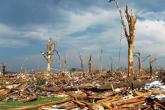An interactive online tool that monitors power outages during major storms could make a life-or-death difference for the more than 1.6 million Medicare beneficiaries who use electricity-dependent medical and assistive equipment, such as ventilators and wheelchairs.
The HHS emPOWER Map, launched by the HHS Office of the Assistant Secretary for Preparedness and Response (ASPR), shows the monthly total number of Medicare beneficiaries’ claims for electricity-dependent equipment at the national, state, territory, county, and zip code levels. The tool combines those data with real-time severe weather tracking services from the National Oceanic and Atmospheric Administration in a geographic information system (GIS).
Related: Pre-Storm Dialysis Saves Lives
The HHS says the GIS-based tool could help hospitals, health care coalitions, and emergency medical services plan better for surges in medical services. It could, for instance, guide electric utility companies in restoring power based on the location of the largest concentrations of electricity-dependent patients. Emergency planners could also use it to determine whether emergency shelters might experience greater electricity demand.
The ASPR is also pursuing other emergency-preparedness solutions, such as equipment signaling technology that will allow family members, caregivers, and responders to remotely monitor a critical device’s back-up battery power.
Related: Perceived Attitudes and Staff Roles of Emergency Management at CBOCs
“With the rise in home-based care, real-time awareness of population-level needs, and the ability to respond to them, is critical,” said RADM Nicole Lurie, MD, MSPH, HHS assistant secretary for preparedness and response. “Better planning helps communities respond better and recover faster.”
